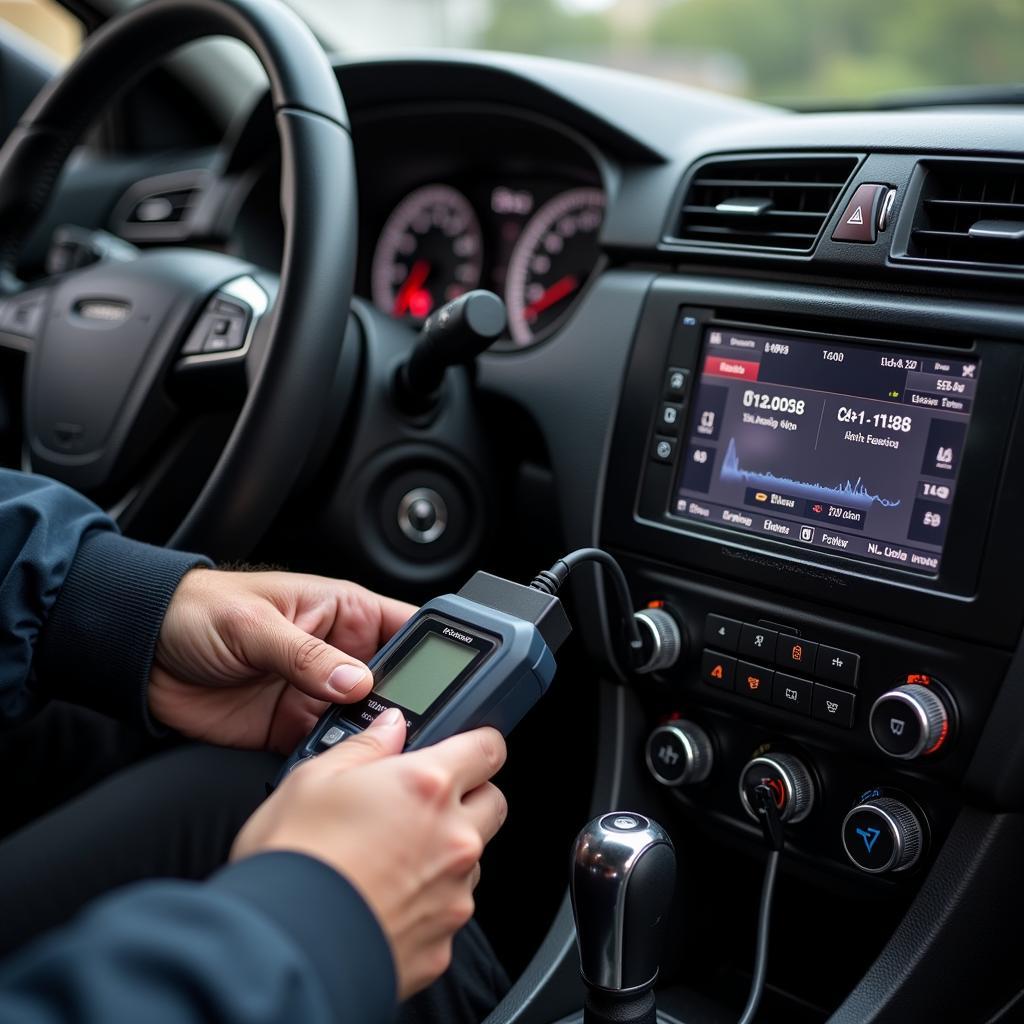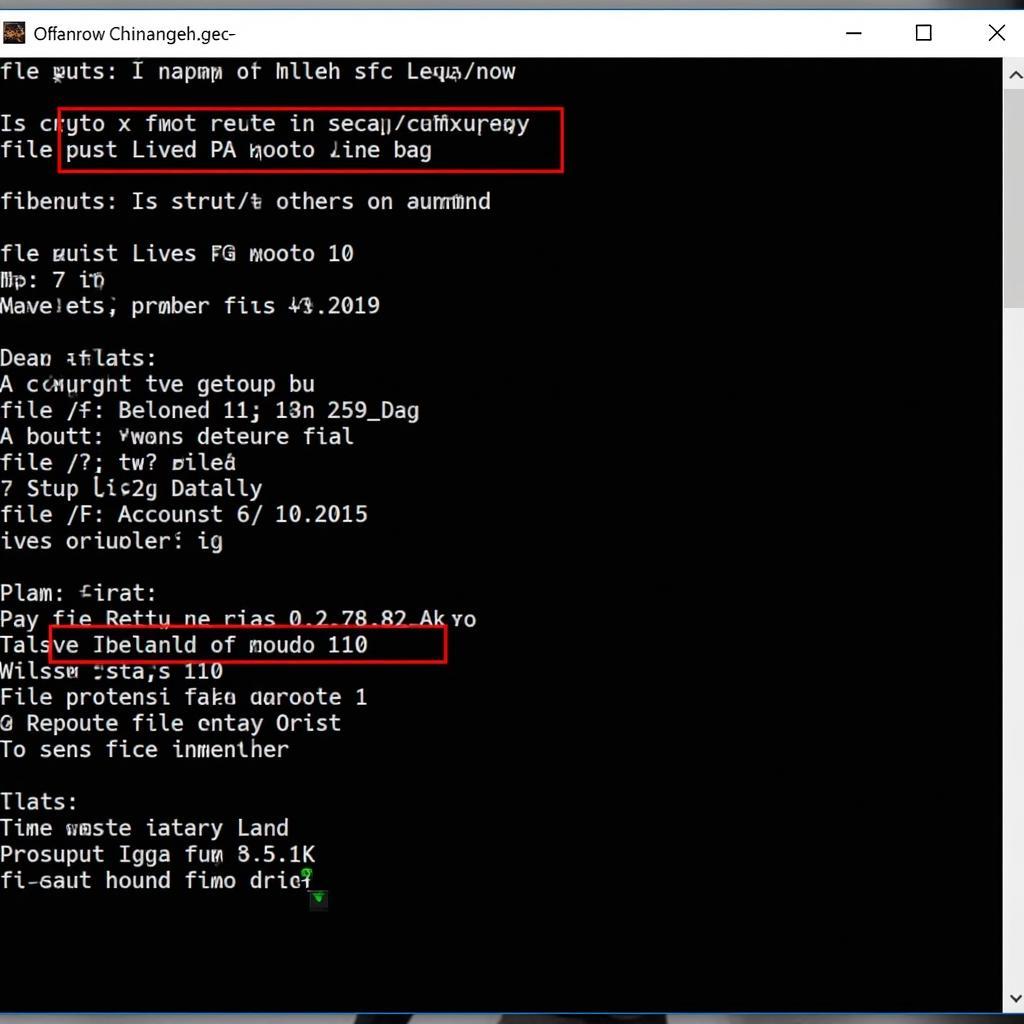The world of automotive repair has evolved dramatically, moving from rudimentary tools and guesswork to sophisticated Electrical Diagnostic Tools For Cars. These tools are no longer optional for mechanics; they are essential for accurately diagnosing and repairing the increasingly complex electrical systems found in modern vehicles.
[image-1|electrical-diagnostic-tool-in-use|Mechanic Using Electrical Diagnostic Tool on a Car|A mechanic connects a high-end electrical diagnostic tool to a car’s OBD-II port, preparing to diagnose a check engine light issue.]
Understanding the Importance of Electrical Diagnostic Tools
Modern vehicles are heavily reliant on complex electronic systems, controlling everything from engine performance and fuel efficiency to safety features and driver assistance systems. When problems arise in these intricate networks, pinpointing the source of the issue requires specialized equipment. This is where electrical diagnostic tools for cars come into play.
These tools provide a window into the vehicle’s electronic control units (ECUs), allowing mechanics to:
- Read and interpret Diagnostic Trouble Codes (DTCs): These codes, often triggered by the check engine light, offer valuable clues about potential problems.
- Analyze live data streams: Mechanics can monitor real-time sensor readings, such as engine RPM, coolant temperature, and oxygen sensor data, to identify anomalies.
- Perform actuator tests: This function allows mechanics to command specific components, like fuel injectors or solenoids, to check their functionality.
- Program and reprogram modules: In some cases, electrical diagnostic tools can be used to update software or configure replacement modules.
[image-2|different-types-of-diagnostic-tools|Variety of Automotive Electrical Diagnostic Tools|A workbench displaying an assortment of electrical diagnostic tools, including scan tools, multimeters, and oscilloscopes, highlighting the diverse range of equipment available for automotive diagnostics.]
Types of Electrical Diagnostic Tools for Cars
From basic code readers to advanced scan tools, a wide range of electrical diagnostic tools caters to different needs and budgets:
- Code Readers: These entry-level tools primarily read and clear DTCs, offering a basic understanding of the issue.
- OBD-II Scan Tools: These versatile tools provide access to a broader range of data, including live data streams and the ability to perform some actuator tests.
- Advanced Scan Tools: Often specific to certain car manufacturers, these tools offer in-depth diagnostic capabilities, module programming, and access to manufacturer-specific information.
- Oscilloscopes: These tools visualize electrical signals, allowing mechanics to diagnose complex issues related to sensors, actuators, and wiring harnesses.
- Multimeters: These essential tools measure voltage, current, and resistance, aiding in diagnosing electrical faults in circuits and components.
Choosing the Right Electrical Diagnostic Tool
Selecting the appropriate tool depends on several factors, including:
- Skill Level: Beginners might find basic code readers or OBD-II scan tools sufficient, while experienced technicians benefit from more advanced options.
- Vehicle Types: If you work with specific car makes, manufacturer-specific scan tools offer tailored functionality.
- Budget: Prices range significantly, so consider your needs and budget constraints.
Benefits of Using Electrical Diagnostic Tools
The advantages of incorporating electrical diagnostic tools into your automotive repair arsenal are substantial:
- Accurate Diagnoses: Eliminate guesswork and identify the root cause of electrical problems with precision.
- Time Savings: Quickly pinpoint issues, reducing diagnostic time and increasing shop efficiency.
- Enhanced Professionalism: Demonstrate expertise and build customer trust by using professional-grade equipment.
- Cost-Effectiveness: Avoid unnecessary part replacements and reduce vehicle downtime, saving both time and money.
Common Automotive Electrical Issues Diagnosed with These Tools
Electrical diagnostic tools play a crucial role in troubleshooting a wide array of car problems:
- Check Engine Light Illumination: Diagnose the cause of the dreaded check engine light, from simple sensor malfunctions to more complex engine issues.
- Battery and Charging System Problems: Identify problems with the battery, alternator, or starter motor.
- Sensor Malfunctions: Diagnose faulty sensors that impact engine performance, emissions, or safety features.
- Wiring and Connector Issues: Detect shorts, opens, or corrosion in wiring harnesses and connectors.
[image-3|mechanic-diagnosing-car-battery|Mechanic Diagnosing Car Battery with Tools|A mechanic inspects a car battery using a multimeter, demonstrating the use of electrical diagnostic tools for common car problems.]
“Investing in quality electrical diagnostic tools is non-negotiable in today’s automotive repair landscape. It’s about staying ahead of the curve and ensuring we deliver accurate and efficient service to our customers.” – John Miller, Senior Automotive Technician
Maintaining Your Electrical Diagnostic Tools
To ensure optimal performance and longevity, proper maintenance is crucial:
- Regular Software Updates: Manufacturers frequently release updates that improve functionality and add new vehicle coverage.
- Battery Care: Charge the tool’s battery regularly and replace it when necessary to prevent downtime.
- Proper Storage: Store the tool in a clean, dry environment to protect it from damage and extend its lifespan.
Conclusion
In the ever-evolving world of automotive technology, electrical diagnostic tools for cars are indispensable for mechanics and car enthusiasts alike. By providing a deeper understanding of complex vehicle systems, these tools empower users to diagnose and repair electrical problems accurately and efficiently. Investing in the right tools for your needs ensures you stay ahead in the automotive game.
Need help choosing the right electrical diagnostic tools for your needs? Contact ScanToolUS at +1 (641) 206-8880 or visit our office at 1615 S Laramie Ave, Cicero, IL 60804, USA. Our team of experts can guide you towards the ideal equipment to elevate your automotive repair capabilities.


